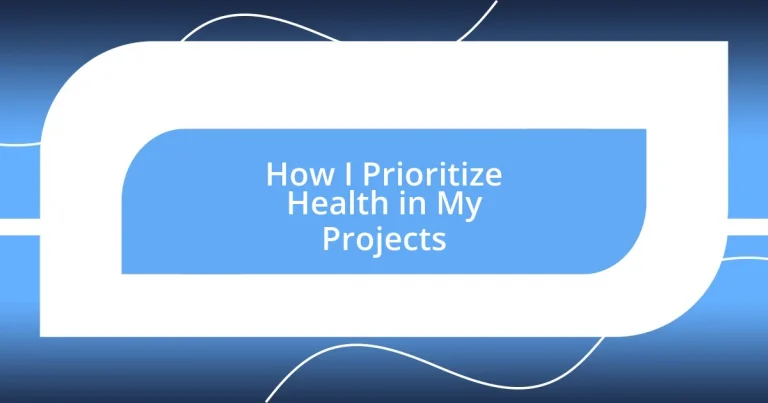Key takeaways:
- Prioritizing mental and physical health through regular exercise, balanced nutrition, and adequate sleep significantly enhances project success and team productivity.
- Integrating health metrics and feedback loops fosters accountability and collective well-being, leading to improved work-life balance and team morale.
- Creating a supportive team environment, characterized by open communication and recognition of individual contributions, strengthens collaboration and resilience within the team.
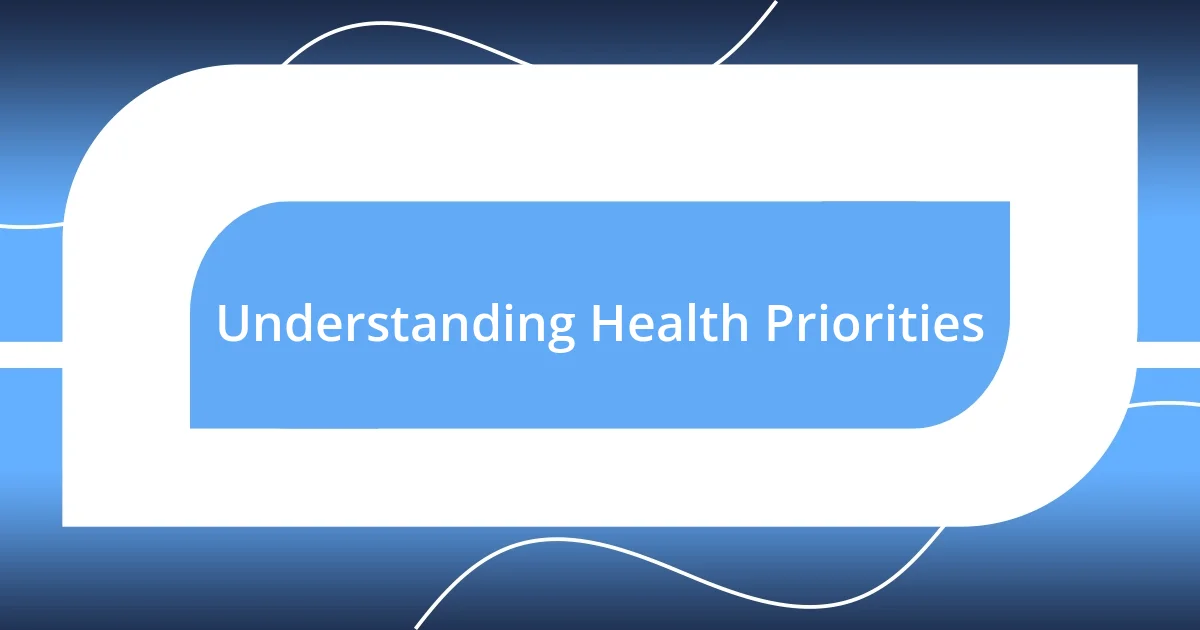
Understanding Health Priorities
Understanding health priorities involves recognizing what aspects of well-being are most essential in the context of our projects. For instance, when I first started balancing multiple tasks, I quickly realized that mental clarity was the foundation for everything I did. Have you ever noticed how fatigue can cloud your judgment? I have, and it made me rethink my approach entirely.
As I dove deeper into project management, I learned that physical health and mental health are inextricably linked. During one particularly demanding period, I neglected my workout routine, and it became evident in my stress levels and productivity. Reflecting on that experience, I now prioritize regular exercise not just as a break, but as a critical component of my overall project success.
Moreover, I’ve found that nutrition plays a pivotal role in sustaining energy throughout the day. Have you ever experienced that mid-afternoon slump? I’ve seen how a balanced diet can prevent those lulls and keep my focus sharp. For me, taking the time to plan healthy meals is as important as scheduling project deadlines. Prioritizing health is not just a strategy; it’s a commitment to fostering a productive environment for myself and my team.
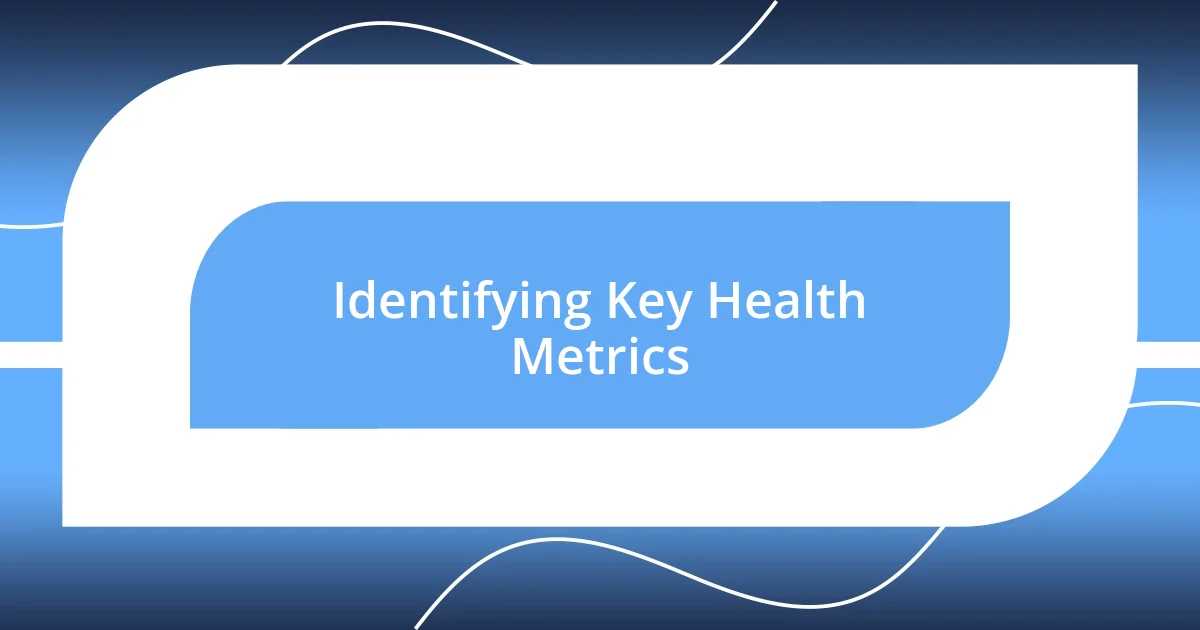
Identifying Key Health Metrics
To effectively prioritize health in my projects, identifying key health metrics becomes essential. I remember a time when I was overwhelmed by deadlines and completely overlooked my sleep quality. Once I started tracking my sleep patterns, I realized how profoundly they impacted my performance. This awakening shifted my focus to measurable metrics that inform my health choices.
Here are some key health metrics I consider important:
- Sleep Duration: Aim for 7-9 hours of quality sleep to boost cognitive function.
- Energy Levels: Self-assess throughout the day, taking note of when I feel most alert versus sluggish.
- Exercise Frequency: Track workouts to ensure I’m moving regularly, ideally 3-5 times a week.
- Nutritional Balance: Keep a food journal to reflect on how different meals affect my concentration and energy.
- Stress Levels: Use mindfulness practices and tools to gauge my stress and incorporate relaxation techniques as needed.
By focusing on these metrics, I create a clear picture of my health and its direct influence on my project efficacy. Every small increase in awareness has led to significant improvements in how I manage tasks and interact with my team. Knowing my health status empowers me to make informed decisions that benefit both my well-being and project outcomes.
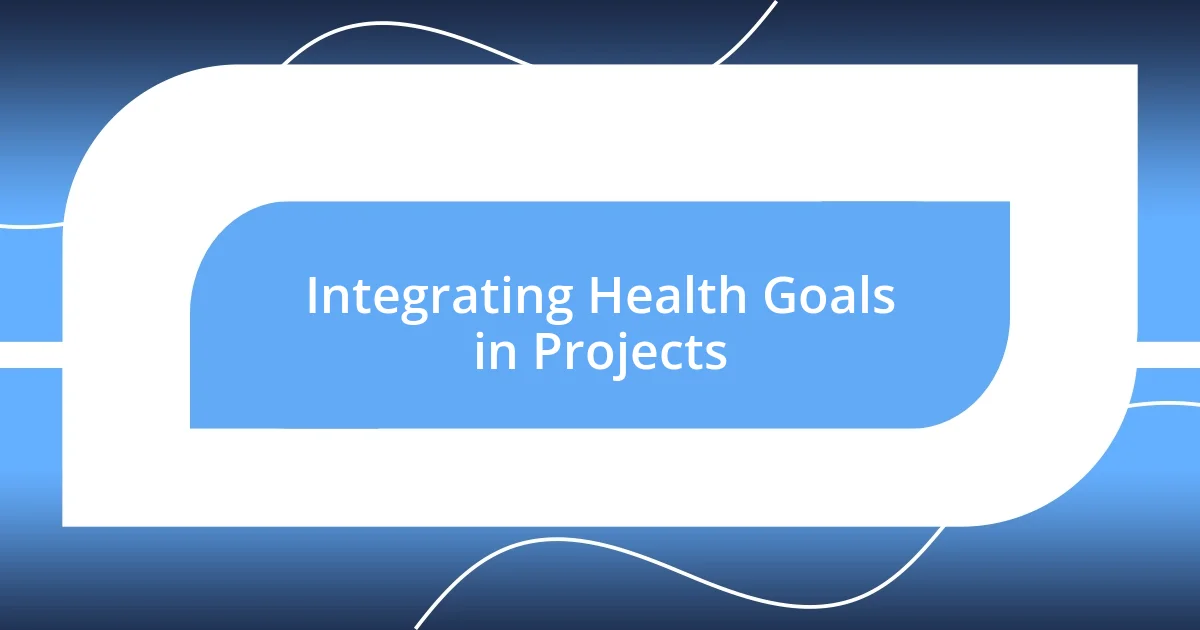
Integrating Health Goals in Projects
To effectively integrate health goals into my projects, I’ve learned to embed them into every phase of the process. For instance, during planning, I actively set aside time for short breaks, ensuring that my team stays refreshed and energized. There was a time when I pushed through long hours without breaks, and trust me, it led to burnout—not just for me, but for the whole team. Now, I advocate for moments of mindfulness, which encourage creativity and boost morale, ultimately improving our output.
When execution begins, I often share my personal experiences with stress management tools such as yoga or deep-breathing exercises. I remember a challenging project where the pressure was overwhelming, and I felt anxious about meeting expectations. Introducing a 5-minute breathing exercise before team meetings became a game changer. It not only calmed anxious nerves but also fostered a supportive environment where everyone felt comfortable sharing their thoughts. I can’t stress enough how this small adjustment shifted our collective mindset and enhanced collaboration.
Evaluating outcomes is another crucial step where I assess not only project success but also our health practices’ effectiveness. In past projects, I’ve organized debrief sessions that included discussions about our health strategies. After one particularly intense project, I gathered feedback about how our health-oriented approaches had influenced our work. The insights I received revealed that simple changes, like having healthy snacks available and allowing flexible work hours, significantly improved productivity and well-being. This experience taught me that reflecting on our health goals is just as vital as measuring project success.
| Health Integration Strategy | Previous Experience |
|---|---|
| Short Breaks | Pushed through without breaks led to burnout. |
| Mindfulness Tools | Introduced breathing exercises before meetings, improved team spirit. |
| Evaluation Sessions | Feedback revealed the positive impact of health strategies on productivity. |
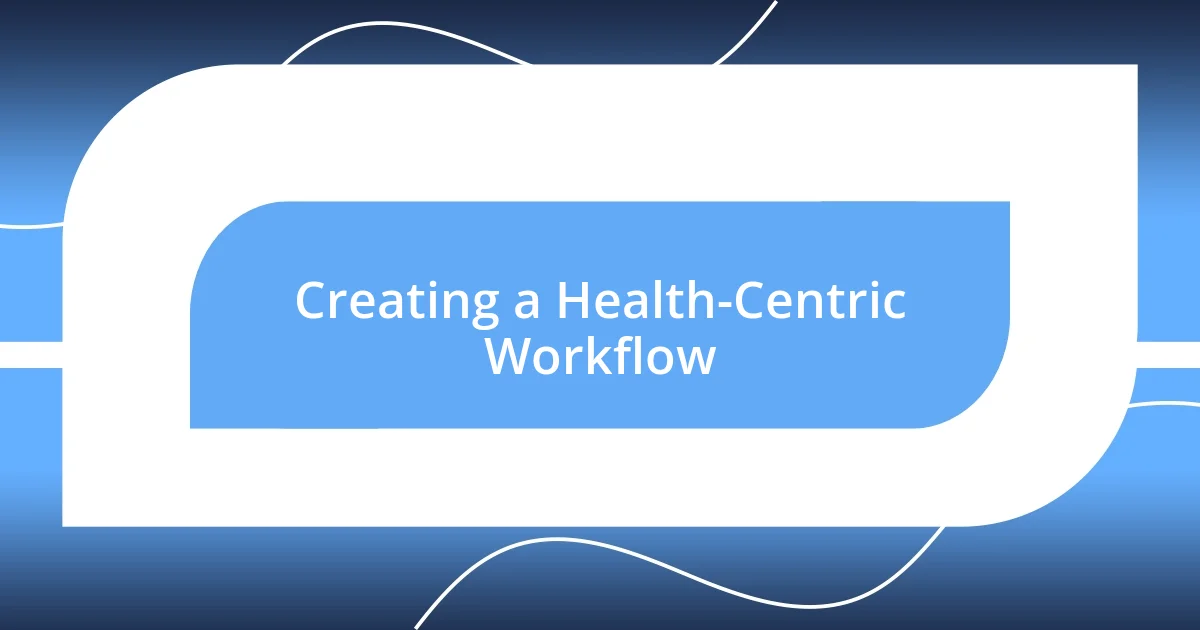
Creating a Health-Centric Workflow
Creating a health-centric workflow is all about weaving wellness into the fabric of how I manage projects. I discovered early on that integrating regular breaks was a game changer. One particularly stressful week, I decided to step outside for a quick walk rather than working through my lunch. That simple act not only rejuvenated my mind but sparked creativity for the tasks ahead. Have you ever taken a break and felt like a fog lifted? It’s amazing how stepping away can help you return with fresh ideas.
In another project, I focused on creating an environment that prioritized health by setting tangible goals for the team. I initiated weekly check-ins that weren’t just about project progress but also involved discussing our physical and mental health. It was enlightening to hear team members share their struggles and victories, and it fostered a sense of accountability. Often, I would share my own challenges—like the time I struggled to balance work and fitness—making it clear that it’s okay to not have it all together. This open dialogue transformed our team culture, offering support in ways I hadn’t anticipated.
Lastly, I’ve learned to celebrate small victories related to health throughout the project lifecycle. After completing a project, I host informal wrap-up gatherings where we not only review outcomes but also acknowledge how far we’ve come in our health journey. I vividly remember one project where we toasted to staying active together, sharing stories about new workout routines we’d tried. It’s these moments of recognition that solidify the importance of a health-centric workflow, reminding us that our well-being isn’t just an afterthought; it’s essential for sustained success. How do you think acknowledging health milestones can influence team dynamics?
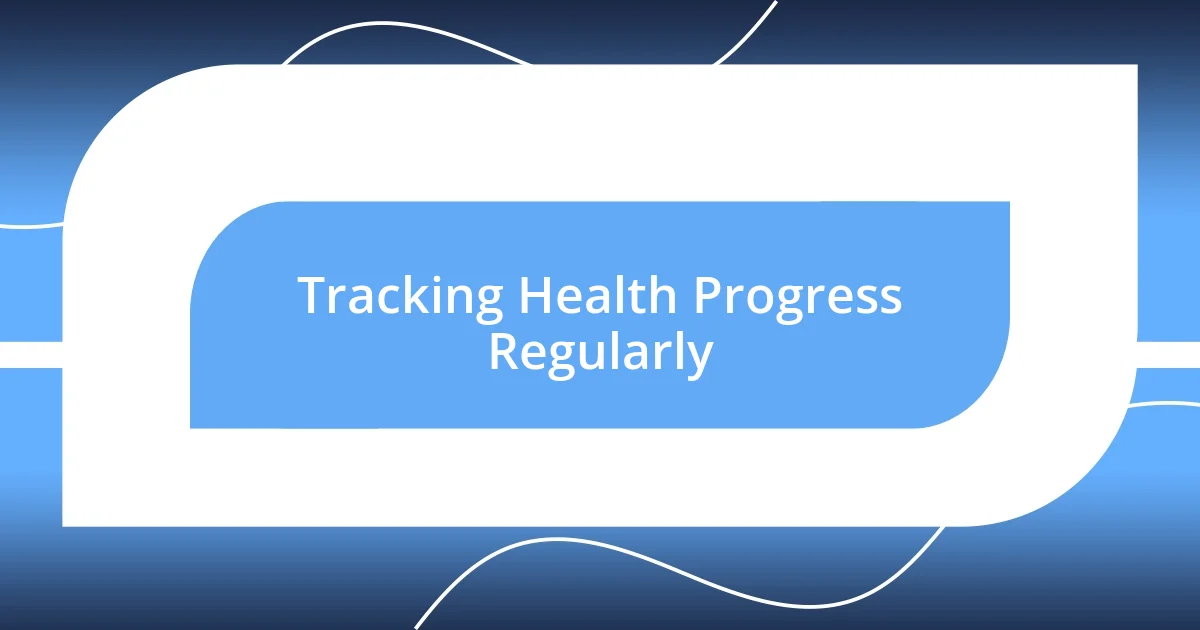
Tracking Health Progress Regularly
Tracking health progress regularly has been a transformative experience for me. I remember implementing a simple habit of weekly self-assessments. This practice allowed me to reflect on my physical well-being and mental state as the project unfolded. It’s surprising how taking just 10 minutes to jot down my thoughts about energy levels and stress made a significant difference. Have you ever tried keeping a health journal? If not, I highly recommend it!
Additionally, I incorporate feedback loops with my team to track collective health metrics. After a particularly demanding month, we sat down to review not only project milestones but also our overall wellness. This session revealed eye-opening insights, such as how working late impacted our sleep and productivity. We collectively agreed to implement a “no email after hours” policy, which has supported healthier work-life boundaries. How often do you check in with your team about their well-being?
I also leverage health tracking apps to monitor physical activity and stress levels. Recently, I challenged myself to walk a certain number of steps each day, celebrating small wins along the way. This challenge not only ignited my competitive spirit but also inspired my team to join in, creating a shared journey towards better health. It’s fascinating how tracking these metrics can foster a culture of wellness that goes beyond individual goals. What will you track in your next project to ensure you’re prioritizing health?
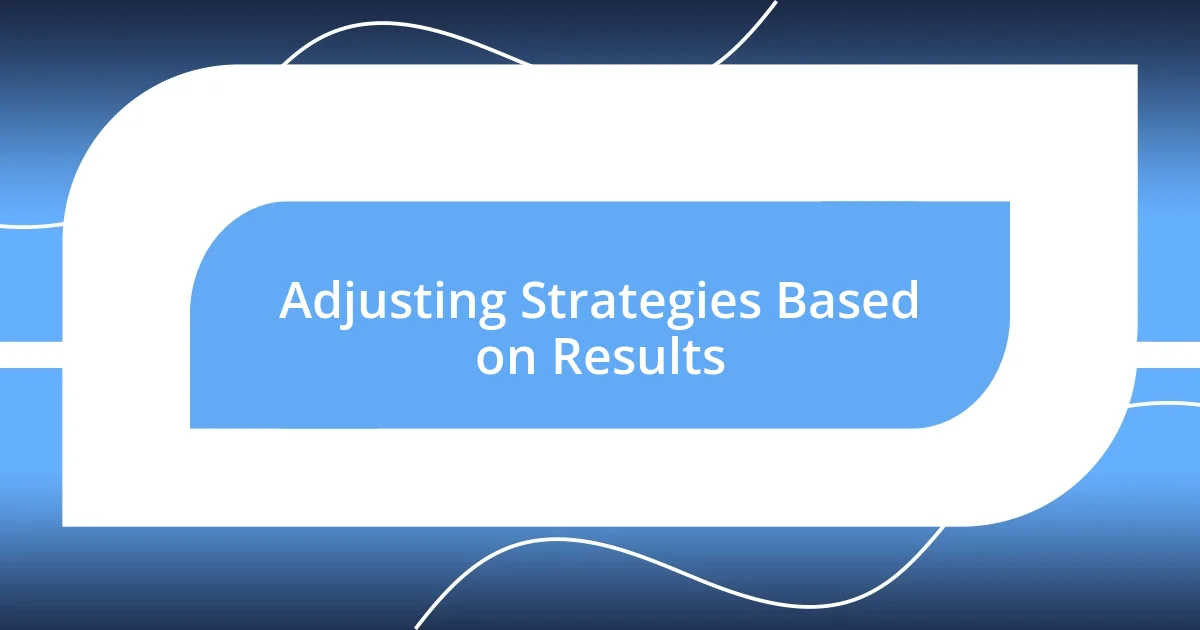
Adjusting Strategies Based on Results
Adjusting strategies based on results is crucial for optimizing both project outcomes and team well-being. I vividly recall a time when we had set ambitious targets without monitoring how they affected our morale. As we delved deeper into the data, it became clear that high expectations were draining our energy levels. It was a revelation. Have you ever realized that sometimes less is more? This insight prompted me to recalibrate our goals, aligning them more closely with what our team could realistically sustain without sacrificing health.
In another situation, I experimented with different approaches to communication during project updates. Initially, we relied heavily on emails, leading to frustration and miscommunication. After reviewing our effectiveness, I suggested a more conversational team huddle once a week. It was interesting to see how this shift reinforced our connection and increased our collective enthusiasm. Did you know that the way you communicate can significantly impact team dynamics? Through these changes, we not only improved our project efficiency but also nurtured a supportive environment.
Sometimes, I find myself reflecting on the emotional impact of our strategies. I remember a pivotal moment when team members openly shared their burnout experiences, echoing my own struggles. This shared vulnerability was a turning point, compelling us to reevaluate not just our project pathways but also the pacing of our workload. What have you learned when opening up about your challenges? For me, it solidified the importance of being adaptable, reminding us that prioritizing health shouldn’t be an afterthought, but rather, a critical aspect of our work strategy.
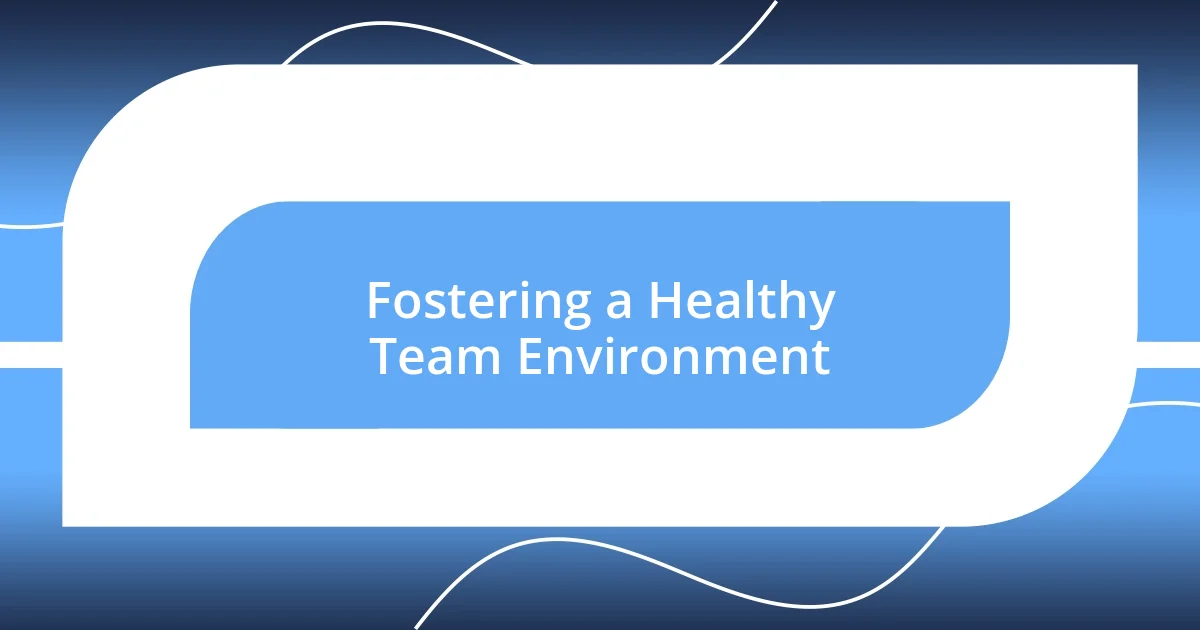
Fostering a Healthy Team Environment
Creating a healthy team environment has been one of my top priorities, and I’ve learned that small gestures can have a profound impact. I once organized informal coffee breaks where we could all step away from our screens and chat about anything but work. Surprisingly, these moments of connection not only boosted morale but also ignited creativity within the team. Have you ever experienced how even a brief pause can recharge your mind?
Another key practice I incorporate is recognizing and celebrating individual contributions regularly. I remember an instance when a team member stayed late to help troubleshoot a critical issue. I made it a point to acknowledge their hard work publicly during a team meeting. This simple act demonstrated that we valued their effort and dedication, strengthening our sense of unity. Wouldn’t you agree that recognition can transform a workspace into a supportive community?
Lastly, I prioritize open lines of communication, encouraging my team to voice concerns without hesitation. There was a time when I sensed some unease regarding project deadlines. Rather than brushing it aside, I called for a team discussion. It was uplifting to see everyone express their thoughts, creating an atmosphere where vulnerability was welcomed. Have you ever had a moment where speaking up completely changed the dynamic of your team? For me, fostering this culture of openness has solidified our resilience and commitment to each other’s well-being.












